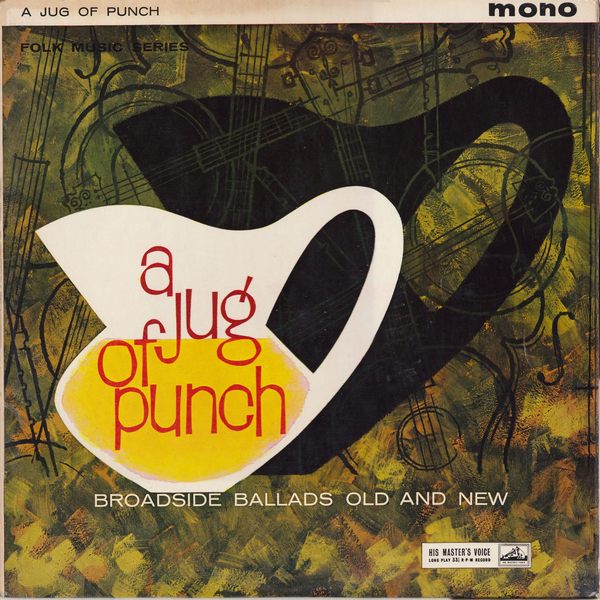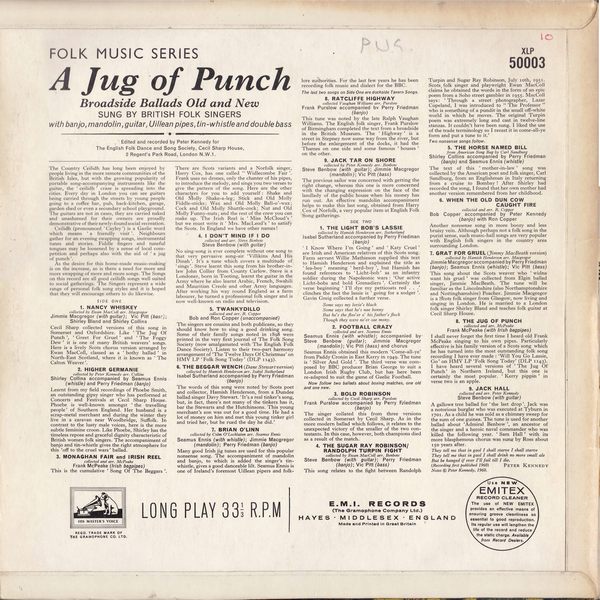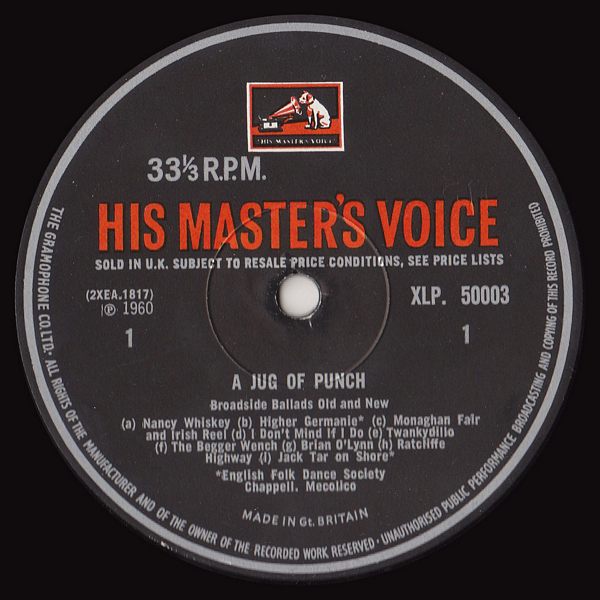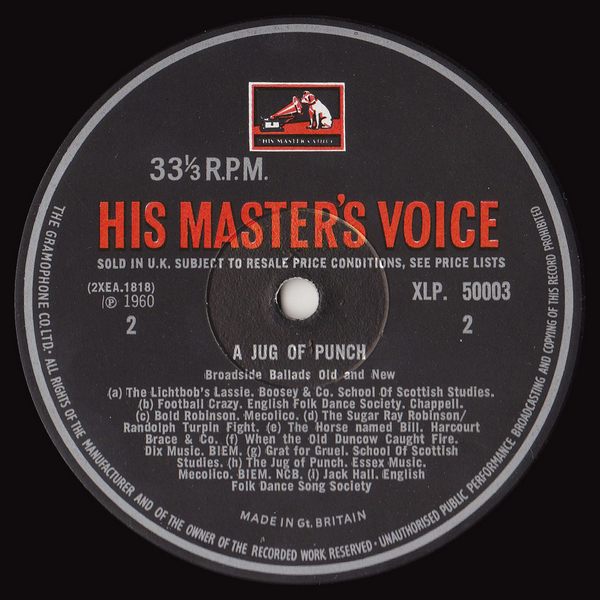
 |


 |
Sleeve Notes
The Country Ceilidh has long been enjoyed by people living in the more remote communities of the British Isles, but with the growing popularity of portable song-accompanying instruments like the guitar, the ceilidh craze is spreading into the cities. Every day in London you can see guitars being carried through the streets by young people going to a coffee bar, pub, back-kitchen, garage, garden shed or even a secondary school playground. The guitars are not in cases, they are carried naked and unashamed for their owners are proudly demonstrative of their newly-found social recreation.
Ceilidh (pronounced Cayley) is a Gaelic word which means a friendly visit. Neighbours gather for an evening swapping songs, instrumental tunes and stories. Fiddle fingers and tuneful tongues may be loosened by a sense of local competition and perhaps also with the aid of a jug of punch.
As the desire for this home-made music-making is on the increase, so is there a need for more and more swapping of more and more songs. The Songs on this record are nil good ceilidh songs well suited to social gatherings. The Singers represent a wide range of personal folk song styles and it is hoped that they will encourage others to do likewise.
Nancy Whiskey — Cecil Sharp collected versions of this song in Somerset and Oxfordshire. Like 'The Jug Of Punch', 'Greet For Gruel' and 'The Foggy Dew' it is one of many. British weavers' songs. Here is a lively Scots chorus version arranged by Ewan MacColl, classed as a 'bothy ballad' in North-East Scotland, where it is known as 'The Calton Weaver'.
Higher Germanie — Learnt from my field recordings of Phoebe Smith, an outstanding gipsy singer who has performed at Concerts and Festivals at Cecil Sharp House. Phoebe is well-known amongst 'the travelling people' of Southern England. Her husband is a scrap-metal merchant and during the winter they live in a caravan near Woodbridge, Suffolk. In contrast to the lusty male voices, here is the more subtle feminine croon. Like Phoebe, Shirley has the timeless repose and graceful dignity characteristic of British women folk singers. The accompaniment of banjo and tin-whistle gives the right atmosphere for this 'off to the cruel wars' ballad.
Monaghan Fair & Irish Reel — This is the cumulative 'Song Of The Beggars'. There are Scots variants and a Norfolk singer, Harry Cox, has one called "Widlecombe Fair'. Frank uses no drones, only the chanter of his pipes, to introduce the melody, and sings you two verses to give the pattern of the song. Here are the other characters for you to add yourself: Shake and Old Molly Shake-a-leg; Stick and Old Molly Fiddle-sticks; Wax and Old Molly Ball-o'-wax; Cock and Old Molly Shuttle-cock; Nut and Old Molly Funny-nuts; and the rest of the crew you can make up. The Irish Reel is 'Miss McCloud's' but we must write it 'Mrs. MacLeod's' to satisfy the Scots. In England we have other names!
I Don't Mind If I Do — No sing-song is ever complete without one song to that very pervasive song-air 'Villikins And His Dinah'. It's a tune which covers a multitude of 'sings'. Steve learnt this song from his brother-in-law John Collier from County Carlow. Steve is a Londoner, born in Tooting, learnt the guitar in the Army where he also learnt Arabic, French, Swahili and Mauritian Creole and other Army languages. After working his way round England as a farm labourer, he turned a professional folk singer and is now well-known on radio and television.
Twankydillo — The singers are cousins and both publicans, so they should know how to sing a good drinking song. Some of their family songs noted in 1898 were printed in the very first journal of The Folk Song Society (now amalgamated with The English Folk Dance Society). Listen to their two-part harmony arrangement of 'The Twelve Days Of Christmas' on HMV LP 'Folk Song Today' (DLP 1143).
The Beggar Wench (Dane Stewart Version) — The words of this song were noted by Scots poet and collector, Hamish Henderson, from a Dundee ballad singer Davy Stewart. 'It's a real tinker's song, but, in fact, there's not many of the tinkers has it, bar the Stewarts and the Hutchinsons. This young merchant's son was out for a good time. He had a lot of money on him and met this young tinker girl and tried her, but he rued the day he did.'
Brian O'Linn — Many good Irish jig tunes are used for this popular nonsense song. The accompaniment of mandolin and banjo, to which is added the singer's tin-whistle, gives a good danceable lilt. Seamus Ennis is one of Ireland's foremost Uillean pipers and folklore authorities. For the last few years he has been recording folk music and dialect for the BBC.
The last two songs on Side One are dockside Tavern Songs.
Ratcliffe Highway — This tune was noted by the late Ralph Vaughan Williams. The English folk singer, Frank Purslow of Birmingham completed the text from a broadside in the British Museum. The 'Highway' is a street in Stepney now some way from the river, but before the enlargement of the docks, it had the Thames on one side and some famous 'houses' on the other.
Jack Tar on Shore — The previous sailor was concerned with getting the right change, whereas this one is more concerned with the changing expression on the face of the landlady of the public house when his money has run out. An effective mandolin accompaniment helps to make this last song, obtained from Harry Cox of Norfolk, a very popular item at English Folk Song gatherings.
The Light Bob's Lassie — 'I Know Where I'm Going' and 'Katy Cruel' are Irish and American relatives of this Scots song. Farm servant Willie Mathieson supplied this text to Hamish Henderson and explained the title as 'lea-boy' meaning 'herd-boy', but Hamish has found references to 'Licht-bob' as an infantry soldier during the Napoleonic wars: 'Our active Licht-bobs and bold Grenadiers'. Certainly the verse beginning 'I'll dye my petticoats red . . .' clinches the fact the lassie is 'going for a sodger'. Gavin Greig collected a further verse.
Some says my lovie's black
Some says that he's nae bonny
But he's the floo'er o' his father's flock
Though they were ne'er sae mony.
Football Crazy — Seamus Ennis obtained this modern 'Come-all-ye' from Paddy Cronin in East Kerry in 1949. The tune is 'Silver And Gold'. The third verse was composed by BBC producer Brian George to suit a London Irish Rugby Club, but has here been re-adapted to suit the game of Gaelic Football.
Now follow two ballads about boxing matches, one old and one new.
Bold Robinson — The singer collated this from three versions collected in Somerset by Cecil Sharp. As in the more modern ballad which follows, it relates to the unexpected victory of the smaller of the two contestants. In this case, however, both champions died as a result of the match.
The Sugar Ray Robinson/ Randolph Turpin Fight — This song relates to the fight between Randolph Turpin and Sugar Ray Robinson, July 10th, 1951. Scots, folk finger and playwright Ewan MacColl claims he obtained the words in the form of an epic poem from a Soho street gambler in 1955. MacColl says: 'Through a street photographer, Lazar Copeland, I was introduced to "The Professor" who is something of a pundit in the small off-white world in which he moves. The original Turpin poem was extremely long and cast in twelve-line stanzas. It couldn't have been sung. I liked the use of the trade terminology so I recast it in come-all-ye form and put a tune to it.'
Two nonsense songs follow.
The Horse Named Bill — The text of this 'mother-in-law' song was collected by the American poet and folk singer, Carl Sandburg, from an Englishman in Italy returning from a cruise to Bombay! After Shirley had recorded the song, I found that her own mother had another version remembered from her childhood.
When The Old Dun Cow Caught Fire — Another nonsense song in more boozy and less bruisy vein. Although perhaps not a folk song in the purist sense, such music-hall songs are very popular with English folk singers in the country area surrounding London.
Grat For Gruel (Jimmy Macbeath Version) — This song about the Scots weaver who 'widna want his gruel' was collected from Elgin ballad singer, Jimmie MacBeath. The tune will be familiar as the Lincolnshire (also Northamptonshire and Nottinghamshire) Poacher. Jimmie Macgregor is a Scots folk singer from Glasgow, now living and singing in London. He is married to a London folk singer Shirley Bland and teaches folk guitar at Cecil Sharp House.
The Jug of Punch — I shall never forget the first time I heard old Frank McPeake singing to his own pipes. Particularly effective is his family version of a Scots song which he has turned into the most outstanding folk song recording I have ever made: 'Will You Go Lassie, Go' on HMV LP 'Folk Song Today' (DLP 1143). I have heard several versions of 'The Jug Of Punch' in Northern Ireland, but this one is certainly the most popular. ''Kerry pippin' in verse two is an apple.
Jack Hall — A gallows tree ballad for 'the last drop'. Jack was a notorious burglar who was executed at Tyburn in 1701. As a child he was sold as a chimney sweep for the sum of one guinea. The tune is used for another ballad about 'Admiral Benbow', an ancestor of the singer and a heroic naval commander who was killed the following year. 'Sam Hall' with its more blasphemous chorus was sung by Ross about 150 years after.
They tell me that in gaol I shall starve I shall starve
They tell me that in gaol I shall drink no more small ale
But be hanged if ever I'll fail till I die.
Notes © Peter Kennedy, 1960